
Final Farewell…
Survey of African American Music has taught me so much throughout this semester. Initially I believed that since I had no previous knowledge of music
While composing my research on Charles “Buddy” Bolden I used various scholarly sources to compile my data. Initially, I thought it would be easy to find information on Bolden since he is so important to the creation of jazz but I was incorrect. In fact, due to the fact that Bolden was born in the late 1800s in the south, there is very little information available about him due to lack of historical record and the fact that he was black in the deep south. Information about blacks were rarely documented, especially during the time where Jim Crow Laws were in full effect. Nevertheless, I was able to find scholarly sources that contained adequate information about the first man of Jazz, Buddy Bolden.
Charles “Buddy” Bolden is known by many as the first man of Jazz. Bolden was born in New Orleans, Louisiana, a town very popular for its rich culture which included very unique music. In this environment, Bolden was able to flourish as a musician and his creativity eventually led to the unique sound that became jazz music. Bolden performed often throughout New Orleans and eventually became known as King Bolden. He was very popular due to his unique techniques in regard to playing the trumpet. The musician was on a pedestal during his peak popularity but things begin to spiral out of control in the early 1900s for Bolden. A series of incidents that provoked questions regarding Bolden’s mental health begin to cloud the musician. Eventually he gave up the cornet and was committed to a mental institution by his family due to his sudden violence and health issues and he remained there for the rest of his life. Even though Bolden’s career ended in tragedy, he is still well known as the first man of jazz and his legacy lives on, even in the present day.
Charles Joseph “Buddy” Bolden was born on September 6, 1877 to Westmore and Alice Bolden in New Orleans, Louisiana. Although there is a lot of controversy surrounding his actual birthdate, Bolden was allegedly born in the same year that the Reconstruction Era came to an end in the south. In 1880 Bolden’s family moved to St. Andrew Street where his older sister died of encephalitis in 1881. Even though Bolden’s family faced difficult times while living in this home, this could have where Bolden first experienced New Orleans style music. Bolden lived in an area in which it was very likely that he “…got his first glimpses of the New Orleans music scene alongside his father, watching parades and attending concerts where the brass bands played…” (Marquis 15). Brass bands in New Orleans at the time were very important, as they were used in churches, social clubs, and other parts of everyday life. Music was prevalent in Bolden’s life simply based on his location, but he began playing the cornet at age seventeen which is late compared to other musicians. Bolden stood out despite his late start because of his natural talent and “…his ability to take the music he had heard around the city and adapt it into his own style…” (Marquis 38). As Bolden began to develop as a musician, he had no desire to imitate others before him he wanted to have his own style.
Buddy Bolden was very innovative and was known by many as creating the first jazz band in 1895. Bolden’s style of music of music was unique to the brass bands that proceeded him, this “new style, particularly when it was played by less literate musicians, seemed coarse and undisciplined” (Porter 17). Jazz music was, in the beginning, “…difficult to distinguish from ragtime’s infectious rhythms” but the genre eventually evolved and became a distinct genre. Even though some musicians had differing opinions on this new style of music, Bolden’s band was very popular. Buddy Bolden’s band had performances as early as 1894 which included performing at parties and small celebrations. Bolden did not have a steady band for some time due to his determination to play the cornet in the style that he chose. Bolden was known for “…playing “wide-open” on the cornet…to create a music sound that people were unfamiliar with” (Marquis 43). There are even accounts of Bolden blowing the cornet so hard that he broke parts of his instrument due to the force of him playing. Although these accounts have not been proven, the accounts prove how well Bolden’s forceful playing style was known throughout New Orleans.
By the early 1900s Bolden was a full-time musician and was known as “King Bolden” in New Orleans. Bolden was known to “embroider the melodies he played, and emphasize their rhythm” (Porter 25). The techniques that Bolden used while playing gained him popularity in New Orleans. Bolden was very popular in bars, clubs, and other popular hangouts for black people at the time of his peak popularity. The musician was hired to play at various parts of town for functions and social gatherings. Some people in New Orleans recall Bolden playing at “…Lincoln and Johnson parks, and Odd Fellows and Funky Butt Halls, but their recollections also place him on advertising wagons, at picnics, excursions, and parties…” (Marquis 56). Buddy Bolden “…prefigured the age of the soloist and was perhaps the most significant figure in the prehistory of New Orleans jazz” (Carney 301).
As Bolden began to gain popularity and fame for his music, his personal life began to impact his life as a musician. In 1906 Bolden was arrested for “…hitting his mother in law with a pitcher…” another story told is that Bolden was “…unable to continue and dropped out before the parade had ended…” (Charters 85). There are many legends about Bolden and his demise, it is common belief that he was an “…innovative musician who played loud, womanized, drank too much, and then went crazy and died broke and alone…” (Kunian). As Bolden continued to grow as a musician, many other musicians began to catch on to these ideas and this deeply bothered Bolden. As his uniqueness as a musician began to fade he started having personal issues. It is documented that Bolden suffered severe headaches in the years around 1906 and he began not showing up for events. Bolden was scheduled to participate in a band competition and he did not show “…implying that he was scared of cutting a contest with Perez…” (Marquis 115). Due to Bolden’s popularity, his strange behavior was definitely noticed by the people of New Orleans.
Bolden’s odd behavior continued to decline and he was eventually admitted to Jackson Mental Hospital in Jackson, Louisiana in 1907. Bolden played occasionally at the Jackson hospital but to those in the institution he “was just another black patient to talked to himself, babbled incoherently, and walked around ritualistically touching objects…” (Marquis 128). The former musician’s physical health continued to decline and he was transferred to another hospital. On November 4, 1931 Bolden died at age 54. Bolden’s music career essentially died with him as he no longer played the cornet but his “departure from the New Orleans music scene did not at first make any noticeable ripple…” (Marquis 133). Although people in New Orleans at the time did not notice Bolden, today he is recognized as the first man of jazz. Although Bolden had left the music scene, jazz music continued to improve due to the fact that later musicians contributed “…a firmer, more total grasp of music’s technical aspects…” (Marquis 135). Bolden paved the way for later jazz musicians, his unique style and unwavering determination to be different from previous musicians had a major influence on the creation of the jazz genre.

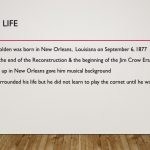
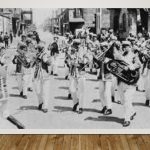
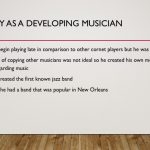
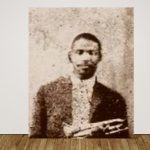
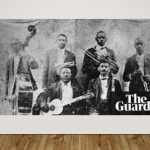
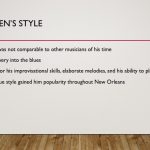

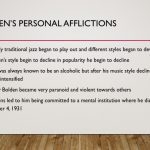
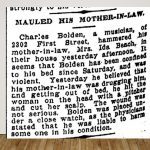
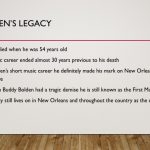
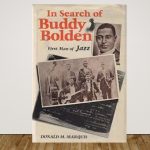

Marquis, Donald M. In Search of Buddy Bolden: First Man of Jazz. Rev. ed. ed., Louisiana State University Press, 2005.
Hardie, Daniel. The Loudest Trumpet: Buddy Bolden and the Early History of Jazz. ToExcel, 2001.
Porter, Lewis, et al. Jazz: From Its Origins to the Present. Prentice Hall, 1993.
Charters, Samuel Barclay. A Trumpet around the Corne: The Story of New Orleans Jazz. University Press of Mississippi, 2008. American Made Music Series. EBSCOhost, login.ezproxy.auctr.edu:2050/login?url=http://search.ebscohost.com/login.aspx?direct=true&db=nlebk&AN=263285&site=ehost-live.
Carney, Court. “New Orleans and the Creation of Early Jazz.” Popular Music & Society, vol. 29, no. 3, July 2006, p. 299. EBSCOhost, doi:10.1080/03007760600670331.
Kunian, David. “The Importance of Buddy Bolden.” Offbeat, vol. 27, no. 5, May 2014, pp. 56-58. EBSCOhost, login.ezproxy.auctr.edu:2050/login?url=http://search.ebscohost.com/login.aspx?direct=true&db=a9h&AN=95648813&site=ehost-live.

Survey of African American Music has taught me so much throughout this semester. Initially I believed that since I had no previous knowledge of music

Funk music was created in the late 60s and 70s and it was influenced by rhythm and blues. Funk music was also important because it

Hip-Hop has its origins in the 1960s in New York within African American communities. In the beginning stages, Hip-Hop was mostly heard at parties or

In 2004 Earth, Wind, and Fire performed alongside the group Chicago at the Greek Theatre. Earth Wind and Fire is a funk group that was

How did the minstrel show develop? Describe its form, major characters, and musical content. When and why did African Americans and White minstrel performances differ?
[embeddoc url=”https://blackmusicscholar.com/wp-content/uploads/2018/04/Gospel-in-the-1940s-1.pdf” download=”all”]
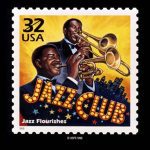
Origin: Jazz music originated in New Orleans, Louisiana and it was inspired by the preceding genres ragtime and the blues. After the enforcement of Jim
Origin: The blues genre originated in the 1890s, particularly in Black communities of small towns in the Deep South or Midwest. Some elements of Blue

Origin: Classical music originated in Europe and there are different divisions of classical music beginning in the 11th century stretching up until the 20th century.
Ragtime was created by African American musicians in the late 19th century but it was the most popular between 1896-1920. The ragtime genre was created
The blues is a genre created in the Deep South and the Midwest. The blues was created by African Americans during slavery and post slavery.
Jubilee Quartets originated in the late 1800s after the growth of the African American singing movement. The quartet groups began post slavery and incorporated some

Throughout slavery there were many limitations and restrictions given to the enslaved people, for the most part they were only permitted to work. Surprisingly many

Introduction: My name is Gabrielle Williams and I am a freshman from Macon, Georgia. I am an Early Childhood Education major. After graduating from Spelman

Login to your account